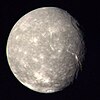Titania is the largest of the moons of Uranus and the eighth largest moon in the Solar System. Discovered by William Herschel in 1787, Titania is named after the queen of the fairies in Shakespeare's A Midsummer Night's Dream. Its orbit lies inside Uranus' magnetosphere. Titania consists of approximately equal amounts of ice and rock, and is likely differentiated into a rocky core and an icy mantle. A layer of liquid water may be present at the core–mantle boundary. The surface of Titania, which is relatively dark and slightly red in color, appears to have been shaped by both impacts and endogenic processes. It is covered by numerous impact craters reaching 326 km in diameter, but is less heavily cratered than the surface of Uranus' outermost moon, Oberon. Titania probably underwent an early endogenic resurfacing event that obliterated its older, heavily cratered surface. Like all major moons of Uranus, Titania probably formed from an accretion disk that surrounded the planet just after its formation. As of 2011, the Uranian system has been studied up close only once: by the spacecraft Voyager 2 in January 1986. It took several images of Titania, which allowed mapping of about 40% of the moon’s surface. (more...)
Recently featured: Richard Barre – Pathways into Darkness – Chew Stoke
